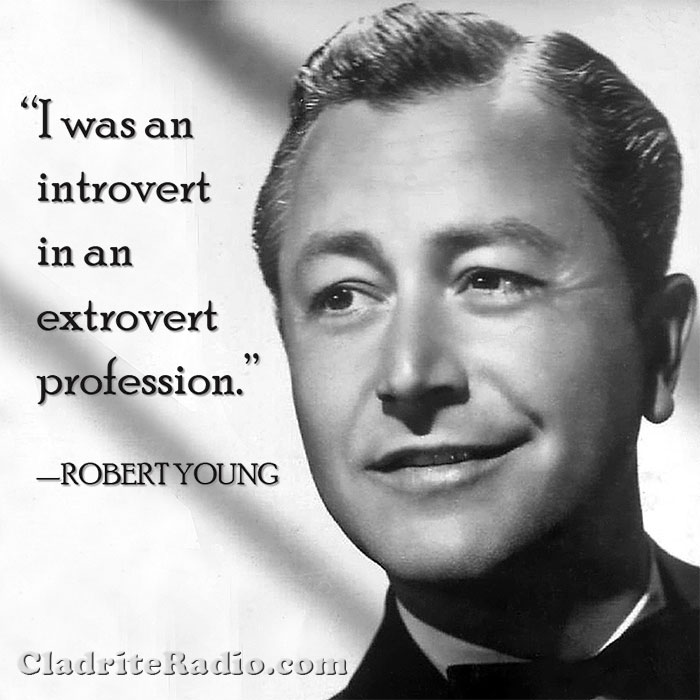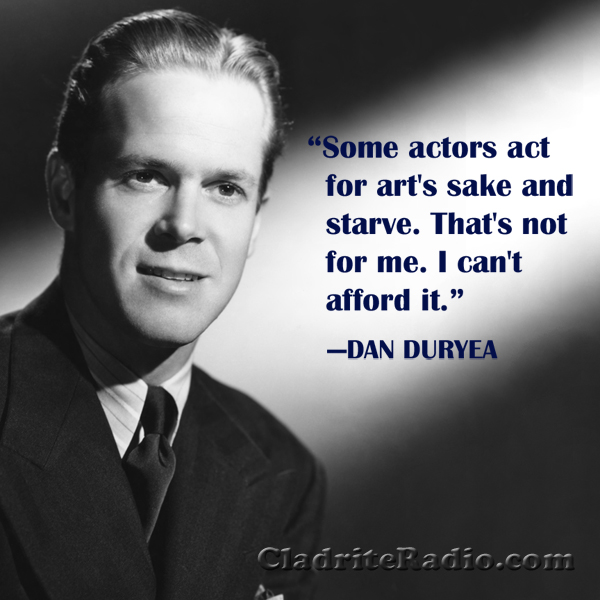Here are 10 things you should know about Dan Duryea, born 116 years ago today. He worked steadily in theatre, television and pictures and in a variety of genres, but it was by playing bad guys in films noir that he made his most indelible mark.
Tag: Franchot Tone
Happy 110th Birthday, Robert Young!
Robert Young, born 110 years ago today in Chicago, Illinois, is best remembered nowadays for his television roles as a wise and affable dad on Father Knows Best and a kindly doctor on Marcus Welby, M.D., but Young also enjoyed a successful movie career in the 1930s and ’40s (he even had extra roles and bit parts in silent pictures in the late ’20s). Here are 10 RY Did-You-Knows:
- Young’s father was an Irish immigrant who moved his family from the Midwest first to Seattle and then to Los Angeles before abandoning the family when Robert was 10 years old. Young would go on to attend Abraham Lincoln High School.
- After high school, Young studied and performed at the famed Pasadena Playhouse before touring with a stock production of a play called The Ship.
- Young was discovered by an M-G-M talent scout and made his talkie debut in 1931 in a Charlie Chan picture called Black Camel. Young appeared in more than 100 pictures over the next two decades.
- Young was occasionally given the kind of role so frequently assigned to Franchot Tone and Robert Montgomery–spoiled young men from well-to-do families, but Young, while a reliable performer, was considered less appealing as a leading man than those two actors. “He has no sex appeal,” Louis B. Mayer is reported to have said of Young.
- Young and his wife, Betty, met when he was 17 and she was 14. They would be married for more than 60 years and had four daughters.
- Young tended to play amiable all-American types, but by the mid-1940s, after his contract with M-G-M came to an end, he was given a number of opportunities to play darker characters, even appearing in a handful of pictures that are today considered film noir classics.
- As his movie career wound down in the late 1940s and into the ’50s, Young began to work more frequently in radio. In fact, it was on radio that he first assayed the role of insurance salesman Jim Anderson on Father Knows Best, which ran from 1949–54 on radio and on television from 1954-60.
- Young was the only cast member to be carried over from the radio version of Father Knows Best to the television series.
- During the 1960s, Young did occasional guest shots on television series and appeared in TV movies, including Marcus Welby, M.D.: A Matter of Humanities, which spawned a popular series by that same name (without the subtitle) that ran util 1976.
- Young struggled with depression for more than four decades (and with alcoholism for more than 30 years) before conquering both in his later years.
Happy birthday, Robert Young, wherever you may be!

Happy Birthday, Dan Duryea!
Given his screen persona, Dan Duryea, born 109 years ago today in White Plains, New York, might not strike the average movie buff as an Ivy Leaguer, but he was, in fact, a member of Cornell University’s class of 1928. He majored in English, but was interested in theatre, too. In his senior year, he even succeeded Franchot Tone as president of the college drama society.
Duryea went on to work in advertising for a bit until the stress got to be too much. A mild heart attack in his twenties convinced him to pursue an acting career instead, a move that paid off nicely. He appeared on Broadway in Dead End and The Little Foxes, and it was the latter play that provided his ticket to Hollywood. Though Bette Davis was named to replace his Broadway co-star, Tallulah Bankhead, in the role of Regina Giddens when Sam Goldwyn bought the rights to produce the cinema adaptation of the hit play, Duryea was retained to play her nephew Leo Hubbard, his cinematic bad guy (or, at the very least, his first weasel).

In an early 1950s interview with Hedda Hopper, Duryea claimed that his focus on playing bad guys was intentional, even planned:
“I looked in the mirror and knew with my ‘puss’ and 155-pound weakling body, I couldn’t pass for a leading man, and I had to be different. And I sure had to be courageous, so I chose to be the meanest s.o.b. in the movies … strictly against my mild nature, as I’m an ordinary, peace-loving husband and father. Inasmuch, as I admired fine actors like Richard Widmark, Victor Mature, Robert Mitchum, and others who had made their early marks in the dark, sordid, and guilt-ridden world of film noir; here, indeed, was a market for my talents. I thought the meaner I presented myself, the tougher I was with women, slapping them around in well-produced films where evil and death seem to lurk in every nightmare alley and behind every venetian blind in every seedy apartment, I could find a market for my screen characters.”
We’re not necessarily convinced that Duryea entered the movie business with that much foresight and wisdom, but it sounded good after the fact, and in any case, it’s certainly true that he came to be closely identified with the film noir genre and known for his memorable portrayals of sketchy (at best) characters, in classics such as The Woman in the Window (1944), Scarlet Street (1945),Criss Cross (1949), and Too Late for Tears (1949).
For our money, Dan Duryea was a sort of poor man’s Widmark, but as we see it, there’s not a thing in the world wrong with that.
A nice guy and dedicated family man in real life, Dan Duryea was married to his wife, Helen, for 35 years until her death and was an attentive parent, serving as a scout master and PTA papa to his two sons.
But on screen, he was the sniveling creep you hoped would get his. And while he usually did, he gave as good as he got.
Happy birthday, Mr. Duryea, wherever you may be—you heel, you.
